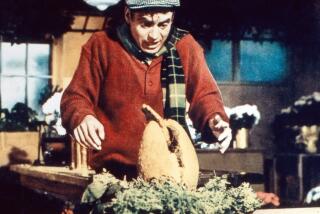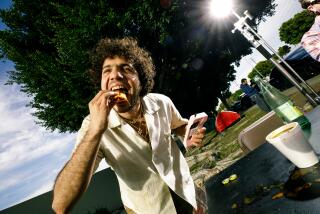Pungent documentaries are his specialty
- Share via
WASHINGTON — It’s appropriate that filmmaker Les Blank would show his work at this year’s Environmental Film Festival. Part of what Blank has become famous for during his 45-year career is creating little environments, especially at screenings of his documentaries about food.
When he shows the 1978 film “Always for Pleasure,” about the food, music and indigenous culture of New Orleans, he’s been known to whip up a pot of red beans and rice in the back of the theater. At presentations of the 1980 documentary “Garlic Is as Good as Ten Mothers” -- about the joys of cooking and eating “the stinking rose” -- Blank can occasionally be spied tossing several heads of garlic into a toaster oven so the aroma wafts over the audience at just the right mouthwatering moment.
“In the film, when [restaurateur] Alice Waters asks, ‘Can you smell the garlic?’ the audience yelled back, ‘Yes!’ ” Blank said recently from his home in Berkeley, Calif., recalling a past screening.
“I never insist on it,” Blank says of the technique he has dubbed “Smellaround.” “Sometimes theater owners worry that the garlic smell will stay in the theater forever.”
With or without olfactory assistance, Blank’s films have made an indelible impression on people who have seen them throughout the years, evoking as they do the sensuous pleasures of cooking and eating, as well as an almost anthropological curiosity about America’s regional food ways.
In “Yum, Yum, Yum” (1990), Blank documents the culinary traditions of Louisiana, specifically its famous spicy Cajun cooking. “Chicken Real” (1970) examines chicken as big business. Without narration, simply training his observant eye and ear on local bayou dwellers and chefs, Blank achieves in half an hour what most filmmakers couldn’t do with twice the time and budget: conjuring a world so specific and vivid that, even without Smellaround, viewers feel as though they can smell and taste what’s bubbling so deliciously on-screen.
If Blank is best known among foodies for his movies about cooking and music aficionados for music documentaries about polka, zydeco and blues artists, for movie fans he’s famous for “Burden of Dreams.” The chronicle of how German director Werner Herzog (a friend and frequent collaborator of Blank’s) traveled to the Amazon River to make his 1982 historical epic “Fitzcarraldo” is one of the greatest documentaries ever made about obsession, artistic commitment and the behavioral oddities of actor Klaus Kinski.
Six years earlier, Blank had made another movie about Herzog, a short film called “Werner Herzog Eats His Shoe,” which shows the title character making good on a bet with Errol Morris that he would never finish his first film, “Gates of Heaven.”
Blank, a soft-spoken man of 69 who still retains the Southern accent of his native Florida, says this week’s Washington festival is the first time his films have been shown in an environmental context, but he can see the connection.
Most of his food movies are, he says, at their core “about good things grown in good ways, eaten well, pleasantly.”
Ironically, it’s a clip of a work in progress that probably qualifies as explicitly environmental.
In 1997, Blank began filming a Berkeley-based tea importer who, on his visits to Chinese tea merchants, found himself trying to explain why pesticides, industrial tea-growing operations and concern with quantity over quality were at odds with the tastes of his high-end customers.
Blank hopes to get some money soon to edit it into a finished product.
More to Read
Only good movies
Get the Indie Focus newsletter, Mark Olsen's weekly guide to the world of cinema.
You may occasionally receive promotional content from the Los Angeles Times.









